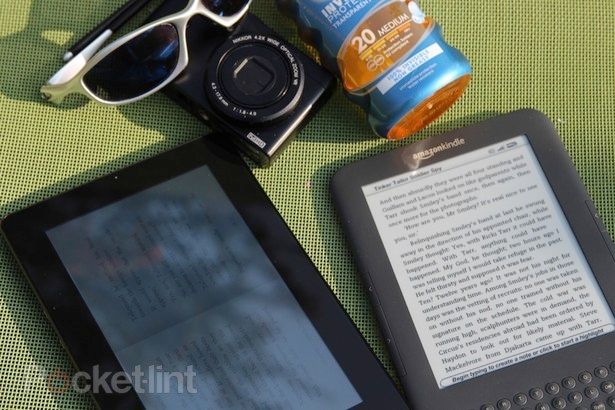Do we really need eBook readers when tablets will do the same and so much more besides? For some, this is a question that perhaps doesn't need asking, but in a quick straw poll around Pocket-lint staff and friends, it seems to be a burning issue.
Responses came back as "eBooks are utterly pointless" or that they "feel antiquated". The opinion of many is that the tablet, in most cases the iPad, will do everything that an eBook reader will do - and in many cases will do it better.
That's true. The touch experience of the Kindle Touch isn't anything like the touch experience of the iPad. They are worlds apart in terms of the speed of response and the wide variety of tasks you can perform on an iPad or Android tablet.
Tablets are in all ways multimedia. They offer full colour, they'll pick up the TV you missed yesterday or play back Full HD movies from your media server. They'll offer you games, social interaction and video calling. The list goes on and on and on, and, yes, they'll let you read books.
And in this David and Goliath contest, the humble eBook reader offers two smooth and deadly pebbles in reply - battery life and an anti-glare screen. Can anyone seriously say that that's enough to fend off the all-singing all-dancing iPad? In the world of device convergence, an advanced tablet takes all the glory.
But that's not the reality of it. This is a mismatched battle, like comparing a pedal bike with a car. Both are modes of transport, yet diversely different.
The same is true of eBook readers and tablets. Both are flat electronic devices with a display that will let you consume books but that's where the similarities end. Bundling eBook readers in with tablets is naïve. It misses the point.
The eBook reader is a device designed to let you read books. That's it. I'm not talking about comic books or textbooks, I'm talking about biographies, novels, literature, the bestsellers, the Man Booker winners, the Orange Prize for Fiction nominees, the Richard and Judy Book Club selection, that surprise debut hit, that novel you read those years ago that's been made into a Hollywood blockbuster.
If you haven't picked up a book to read in the past year, then the Kindle isn't something you'll understand. The iPad will win. But if you've ploughed through 10 books in the last year, and they are currently lined up along the top of your dresser, then perhaps it’s time to take note. The eBook reader - cheap, lightweight and with a long battery life - is the closest you'll get to reading on paper without actually reading on paper.
And therein lies the problem. Convincing people they need a tablet, with all its features, is fairly easy. Convincing people to replace their future book purchases with a single electronic device is more difficult. People like books. They like the feel of the paper; the smell as you flick through the pages. They like the simplicity.
But let's not confuse these two very different devices. With an eBook reader you can sit by the pool and read on your holiday. You can sit on the train with the spring sunshine streaming through the windows as the lush, green countryside speeds past the windows and read. On a tablet this is uncomfortable, if not impossible.
Both devices have their places within the same household - one is an all-rounder, the other a specialist - but, just because the tablet will display your novels, that doesn't mean it replaces the eBook unit. Devices like the Kindle Touch are for people who read books and, if you don't, you'll never understand the appeal.
- Amazon Kindle Touch UK release date set for 27 April

